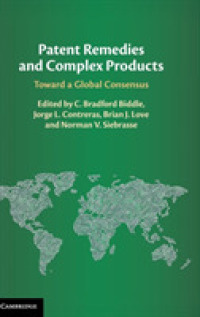- ホーム
- > 洋書
- > 英文書
- > Politics / International Relations
Full Description
How can we know a country, such as the United States or China, is revisionist, that is, whether it intends to upset the international order?
What motivates states to act the way they do? Contesting Revisionism focuses on a particular kind of motivation inclining a state to challenge the existing norms, rules, and institutions of international order: revisionism. The authors offer a critique of the existing discourse on revisionism and investigate the origin and evolution of the foreign policy orientations of revisionist states in the past. Furthermore, they introduce an ensemble of indicators to discern and compare the extent of revisionist tendencies on the part of contemporary China and the United States. Questioning the facile assumption that past episodes will repeat in the future, they argue that "hard" revisionism relying on war and conquest is less viable and likely in today's world. Instead, "soft" revisionism seeking to promote institutional change is more relevant and likely. Focusing on contemporary Sino-American relations, they conclude that much of the current discourse based on power transition theory is problematic. A dominant power is not inevitably committed to the defense of international order, nor does a rising power always have a revisionist agenda to challenge this order. The transformation of international order does not necessarily require a power transition between China and the US., nor does a possible power transition necessarily augur war. After developing the concept of revisionism both theoretically and empirically, they conclude with a series of policy recommendations for enhancing international stability and diminishing tension in Sino-American relations.
Contents
Preface
Chapter 1: Basic Rationale and Arguments
Chapter 2: The Origin and Evolution of Revisionism
Chapter 3: Meaning of International Order and Evidence on Revisionism
Chapter 4: Revisionist States' Strategies and Encounters with their Counterparts
Chapter 5: A Peaceful Transition of International Order?







